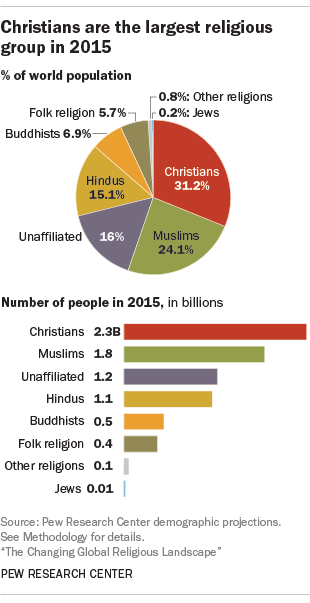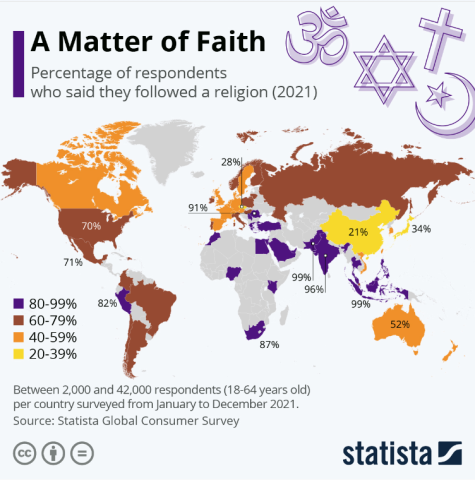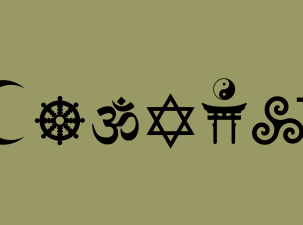Religions

Religion, Faith, and Spirituality – A Catalyst for Peace?
Religion has played an important part of human culture and society since the dawn of our existence. It influences how we see the world around us and helps us to form core values. For many, religion provides community, purpose, and a sense of belonging. With 86% of the global population following some form of religion, this sense of unity and social cohesiveness is the common denominator among all religious groups.
“My religion is very simple. My religion is kindness” - Dalai Lama
Religions can take various forms, including the belief in one or more gods, worship of ancestors or spiritual beings, and belief in the existence of forces or energies beyond the material. Religion can provide us with hope in dark times, help us to understand the unexplainable, and teach us kindness, compassion, and forgiveness.
Better World Info’s ➡️ platform for religion provides over 4,600 resources on the major religions of the world, religious tolerance, atheism, the role of pacifism in religion, the right to religious freedom, examples of religious discrimination, important religious leaders, and even on materialism as the world's 'biggest religion'.
The role of religion has changed over the years, influential leaders from many religions are pushing for positive change from politicians and governments. The Pope for example, has been calling on leaders to end divisions and urgently address climate change.
Religion has also become less important to people, especially in younger generations. Globally, religion is on the decline as the rise of people with no religious affiliation diminishes its influence. In the U.S. for example, 43% of 18–29-year-olds when asked which religion they follow, responded ‘none’.
For up to the minute news by religious leaders and groups on peace, coexistence, religious education, events, and political issues, be sure to follow our Twitter list on Religion.
Make sure to check out our related topics on peace, culture, social justice, and human rights. German speakers should visit our partner site Bessere Welt Info for over 5,000 links on Religionen.

Major Religions of the World
Our guide to the major religions of the world aims to promote an understanding of the origins, rituals, beliefs, and traditions of the most widely practiced religions. Religious education is a key tool in preventing harmful stereotypes. It also allows us the chance to raise questions and reflect on the important questions in life, develop our sense of place in the world, and explore our own spirituality and morals.
Christianity is currently the world's largest religious group, with 2.3 billion followers. Christianity is the predominant religion in Europe, the whole American continent, a vast part of sub-Saharan Africa, Russia, and Australia.
We explore the intricacies of the various churches including Catholic, Protestant, and Orthodox. Find insightful resources on the Pope, the Vatican, various Christian organisations, and Christian pacifism.
Islam is the second largest religious group and also the fastest growing. Between 2015 and 2060, the global population of Muslim's is projected to increase by 70%.
Find comprehensive guides to the Qur'an, Islamic perspectives on peace, the role of women in Islam, organisations, holy sites, Ramadan, the Muslim pilgrimage Hajj, and the rising issue of Islamophobia.
Hinduism forms the next largest religious group and is predominantly practiced in India and Nepal. Hindus value truth, love, and Hindu rituals and ceremonies call for universal harmony and peace. Vegetarianism is common amongst believers.
An important principle is the law of karma which holds a person responsible for their actions and deeds. The gods and goddesses in Hinduism are called deities, the number of which is said to be anywhere between 33 and 330 million.
Buddhists on the other hand do not acknowledge Gods or deities, they focus instead on the individual achievement of enlightenment – a state of inner peace and wisdom. The countries with the largest Buddhist populations are China, Thailand, Japan, and Myanmar.
Discover excellent resources on the teachings of Buddhism, Buddhist leaders, spiritual centres, mindfulness, and the Buddhist view on consumerism.
Make sure to explore our guides to other religons which offer comprehensive insight into Judaism, Quakers, Jainism, Sikhism, Mormons, and many more.

The Right to Religious Freedom
Religious freedom is a fundamental human right which is protected by many international agreements and treaties. It means that everyone has the right to openly practice their religion without being discriminated against or persecuted.
Despite these protections, religious freedom is under threat across the globe and there has been an increase in persecution in recent years. As a key component to peace, the importance of this right must not be underestimated.
Religious minorities such as the Uighurs in China, Muslims in India, and the Rohingya Muslims in Myanmar face daily threats to their lives, forced labour, and suppression of religious practices. These minority groups are targeted and driven from their homelands. In Myanmar for example, 960,000 Rohingya refugees have fled, and are mostly living in dire refugee camps in Bangladesh.
Attacks on places of worship have increased, and we are seeing more examples of Islamophobia in the U.S, Europe, and in particular in France where Muslim women and girls have been banned from wearing the hijab. We also feature an extensive guide to the Mahsa Amini protests in Iran which saw widespread civil unrest after Amini was arrested by the Guidance Patrol for violating Iran’s mandatory hijab law. She was severely beaten by officers, and later died in their custody.
Incidents of antisemitism are also continuing to rise, this includes harassment, deadly attacks, and the vandalism of Jewish institutions. Since the start of the Israel war on Gaza in October 2023, the Anti-Defamation League has reported an almost 400% increase in antisemitic incidents reported.
Religious tolerance, interfaith dialogue, education, and understanding are key to promoting a world where everyone can enjoy the right to religious freedom. Accepting the views of other religions without judging or criticizing is an important step towards peace and harmony between different cultures and faiths. It is not about giving up your own religion, but about creating an atmosphere of respect and recognition that allows us to live together peacefully.

The Relationship Between Religion and State
State religions exist when sovereign states officially endorse a certain religion. We see examples of this in the Middle East where many states recognise Islam as the official faith. Other examples include Buddhism in Cambodia and Myanmar, Catholicism in Spain and many Latin American countries, and the Church of England in, you guessed it, England.
The relationship between religion and state is a complex issue. In many countries, religion has a significant influence on political and social life, while in others there is a strict separation of church and state. This relationship usually has implications for religious freedom as religious restrictions impacting our everyday lives effect all citizens regardless of individual beliefs.
When religion and state are intertwined, this can influence important policies on everything from human rights, to education, healthcare, women’s rights, and even environmental protections. The Pope’s active role in the promotion of climate action has proven to be an important motivator for leaders to step up their environmental commitments.
There are however many instances where this relationship has resulted in the restriction of rights, the drawing back of freedoms, the isolation of marginal communities, and even threats to democracy. The recent decision by the U.S. Supreme Court to overturn Roe v. Wade resulted in the removal of the constitutional right to abortion for U.S. women. In this case, religion played a central role in the Justices decisions which now influences the lives of women throughout the country.
Theocracies exist when a state is governed directly by a religious authority, in these instances laws and policies are based on the interpretation of religious texts. Islamic Republics such as Iran, Saudi Arabia, and Pakistan are ruled under Islamic law. The 2021 Taliban takeover in Afghanistan plunged Afghanis into turmoil as women's rights were withdrawn, and severe restrictions were placed on the right to study and work, freedom of movement, appearance and dress requirements, and even access to entertainment.

Embracing Spirituality - Inner Peace and Personal Growth
Spirituality is highly personal and comes in many forms. It can help us to find peace, calm, and allows time for personal reflection and growth without being committed to any specific religious group. In the U.S. 70% of adults consider themselves spiritual in some way.
This connection to a higher purpose can help us find meaning in life, relieve us of dependence on material things, and can result in improved mental health. Spiritualism often goes hand in hand with positive emotions such as compassion, empathy and open heartedness.
Spirituality can be promoted through various practices such as meditation, prayer, and yoga. It can also be inspired by nature, art, and music. Cultural events such as Day of the Dead in Mexico are highly spiritual. This day serves as a celebration of deceased loved ones and helps to keep their memory alive. Discover more information on gurus, sects, spiritual organisations, and more.

The Growing Popularity of Atheism
Atheism is the lack of belief in a higher power or God. It is an often misunderstood and misinterpreted philosophy, sometimes viewed as nihilistic or even amoral. However, atheism is actually more of a positive and optimistic worldview based on reason and science that promotes freedom of thought and expression.
Atheism is popular in Europe, and it is spreading. In the Czech Republic, 25% of adults identify as atheists. Other surrounding countries have similar numbers. People are more likely to say that they do not believe in God as opposed to identifying with atheism as they may still believe in some form of higher power, or class themselves as spiritual. In Sweden, Belgium, and the Netherlands, more than half of the population do not believe in God.
The popularity of atheism is growing for various reasons. People are becoming more open minded and curious, they want to take control over their own narratives, and do not rely on God to lead a happy, fulfilling, and purposeful life. Religion as a cause of conflict also plays a role in why people are turning away from faith.
It is estimated that between 1950-1996 religious conflict made up 33-47% of all wars. In some parts of the world it can be dangerous to be publicly atheist. There are 13 countries where scepticism of religion and blasphemy are punishable by death.

Religious Leaders Inspiring Change
With their huge followings, religious leaders have the potential to spread positive influence over vast numbers of people. We highlight the inspiring leaders in religion who promote the importance of uniting on global issues such as climate change, peace, human rights, social justice, and environmental protection.
Explore the impact of important religious leaders who have helped to bring more peace, stability, and tolerance to our world. Role models such as Roman Catholic priest Bruce Kent who campaigned for nuclear disarmament with the CND, peace activist and Vietnamese Buddhist monk Thich Nhat Hanh, and of course the Dalai Lama whose nonviolent opposition to the occupation of Tibet has drawn international praise.

Embracing Religion and Spirituality for a Better World
In a world characterized by diversity and conflict, it is important to educate ourselves on different religions and beliefs. Religious understanding and tolerance helps us avoid prejudices and stereotypes that are based on ignorance and misinformation. An open attitude and willingness to consider different perspectives can help promote unity, cooperation, and peaceful coexistence.
We believe that religion can be a powerful force for good, fostering community, and progress within humanity. Peace, nonviolence, and reconciliation are central themes in all religions, alongside forgiveness and selflessness.
"Whether one believes in a religion or not, and whether one believes in rebirth or not, there isn't anyone who doesn't appreciate kindness and compassion." - Dalai Lama
Author: Rachael Mellor, 11.01.24 licensed under CC BY-ND 4.0
For further reading on Religion see below ⬇️
Info on Religions
- On Religion[379]
- Islam[1619]
- Christianity[1388]
- Buddhism[425]
- Hinduism[157]
- Other Religions[488]
- Gurus & Sects[427]
- Exemplary People on Religion
Hot Topics
Twitter list
Tweets by @BetterWorldInfo/lists/religions


Featured Online Resource of the Month
A Common Word
A Common Word Between Us & You is a letter signed by leaders of the Islamic and Christian religions to present a united front. It calls for peace between Muslims and Christians and tries to work for the common good and understanding between both religions.









